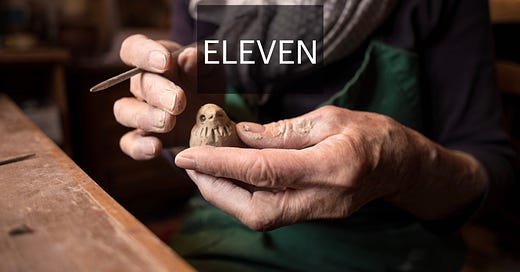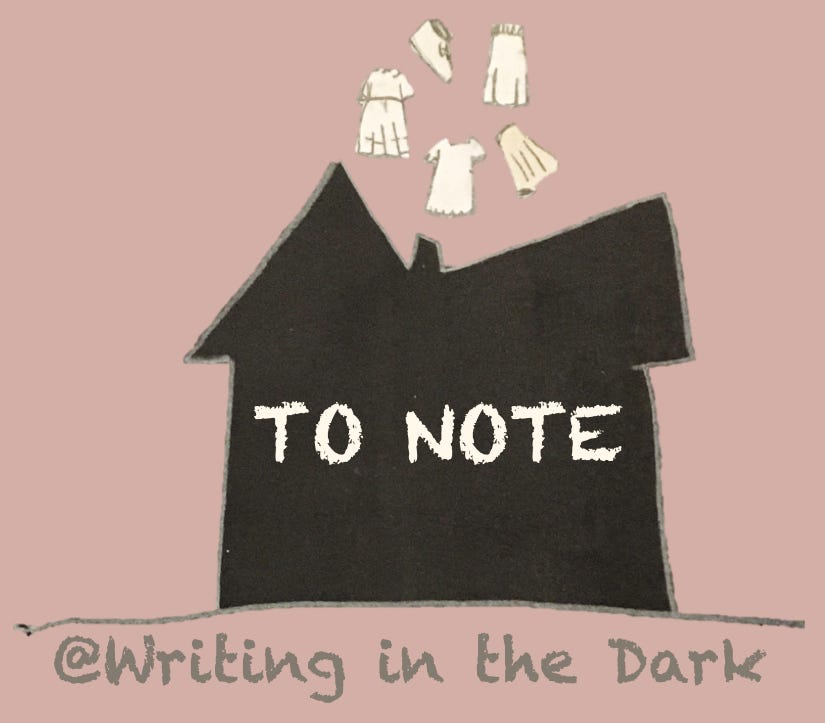On Purpose and Zero-Waste Writing—Or, How to Finally Finish A Thing
Essay in 12 Steps | ELEVEN | "You have to finish things—that's what you learn from, you learn by finishing things." ~Neil Gaimon
Second-ever Voice Memo is up! Preview below and full episode here.
First-ever Live Salon (on Zoom) coming up Oct. 29th at 12pm CT—mark your calendars and watch for more info soon!
Sliding-Fee Scale Workshop Opportunity! What if readers can't connect with your narrator? Jill will address voice in memoir during a 3-hour workshop on Sat 10-14 and she has sliding-fee scale spots available. A wonderful opportunity to work with Jill, who has helped many writers bring their books to publication.
I’m going to talk about finishing things. But first, we must explore how we come to be able to recognize and commit to the the thing we are seeking to finish. And for that, a story.
On Purpose
About ten or eleven years ago, during the height of our hot yoga phase, Billie and I had rushed down University Ave to make it to a 7:30pm candlelight class. This was before the Dinkytown studio on the U of M campus shut down. That studio—perched above a fried chicken joint and a noodle shop (and adjacent to a smoke shop!), was where I finally fell truly madly deeply in love with yoga after two decades of dabbling. That studio is also where I completed my yoga teacher training when I decided I wanted to be pulled deeper into something, which turned out to be … myself, I wanted to be pulled deeper into myself.
In that second-story studio, when we pressed our ears to the mat, we could hear the muffled sound of people talking and music playing below. It was a small studio and—due to the awnings and northern-facing windows—always a little dark. Anyway, I really loved that studio. And on that particular night at that 7:30 candlelight class, one of my favorite teachers was leading class.
Life being what life is, Billie and I were running late and we had barely made it into our leggings and onto our mats before the door closed. But as we settled into child’s pose, and into ourselves, our teacher reminded us of the importance of doing things on purpose. Put your arms by your side or rest them on your belly … either is fine, just as long as it’s on purpose. Close your eyes or leave them open, either is fine, just make sure it’s on purpose. Let your legs stretch long or bend them at the knees—just be sure to place them on purpose. Our teacher returned to this purpose-driven refrain throughout our magical flickering hour together.
After class, during the ritual yoga class debrief that Billie and I tended to enjoy on the drive home from, we both came back to those words: on purpose.
It's a simple phrase that often brings me back to my teaching days and the playground squabbles full of half-true defenses: “It wasn’t on purpose Ms. Ouellette!” But in the context of the yoga class, it meant something much, much simpler, much truer.
Pay attention. Make a choice. Own your choice.
As yoga should do, this immersion into the concept of doing things on purpose taught me more off my mat than on. Especially in my writing practice. On the micro level of the sentence—choose my words on purpose. On the macro level of aboutness—why this story? Why me the one telling it? Even beyond that, in my life, am I moving with clarity and purpose?
For this week’s step, I am “stealing” (in the manner all good artists should steal, ala
) this phrase and turning it over to all of you. I am going to ask you to make some choices on purpose—choices that will lead you to the completion of a piece of work. Something you can celebrate as the product of this Essay Challenge.Finishing & Zero Waste Writing
I am a believer in zero waste writing—which means everything you make may become something sometime. It’s all valuable material. But, for now, we need to define a clear and achievable goal of what you can make in the next week (or so).
And yes, you can all finish something—you really, truly can! Regardless of the mountain of mayhem or pile of possibility you might have before you at present. I know that many of you have told me or written in the comments about how this process has led you down paths and through doors towards things you never expected to be exploring. Some of you have many starts at several different essays. Some of you have gone deep into the fruitful weeds on longer-form memoir projects in ways that have surprised you.
Some of you have started all over.
All of the above is good! That is amazing and part of the creative process.
But another part of what makes a challenge, a deadline, a defined period of time magical is the way it can compel us to cross the finish line.
The way it can force us to let go.
Let It Go
In order to breathe life into something we have made, in order to let it become part of the world (and this has nothing to do with publishing per se) we have to let it go. This can be extremely difficult for some of us (and I talk more about this in this week’s WITD voice memo which you can check out here).
But if at the end of twelve weeks of hard and growth inspiring work we don’t allow ourselves the gift of saying I did it, look what I did—well, then, we are just robbing ourselves of joy. Of gratification. Of the flood of positive chemical reactions in the brain that tell us to go ahead and do it again for more of that good, good feeling.
That’s what this week’s stepwise exercise is meant to do: lead you through a process of identifying, defining, and naming the precise thing you are able to finish in the week ahead (don’t worry, you’ll still have Week Twelve for assessing revisions).
Whatever you identify, define, and name this week is just for now—the thing you are completing right now. That doesn’t mean it can’t become something different or more later. It can. But not until it comes into existence as the most realistic version of a finished thing today.
Here’s how to make that happen.









